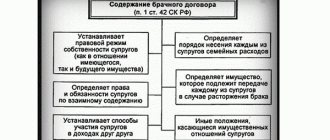The divorce process involves resolving issues related not only to children, but also to the jointly acquired property of the spouses. In some cases, divorce can occur without division of property. Such situations include cases where the spouses do not have joint property, or the division of property occurs before or after the divorce.
Divorce is carried out by filing an application with the registry office or in court. The couple submits an application to the registry office if the spouses do not have property disputes and minor children. Otherwise, the decision on divorce will be made by the court.
Is divorce possible without division of property?
Divorce in itself is a rather complex process. Both parties will have to resolve issues not only about the fate of their children, but also their common property.
All property that was jointly acquired by partners during the marriage relationship is their joint property (apartment, car, land, securities, etc.) and upon divorce is subject to division, as a rule, into equal shares (Article 34 and Article 39 of the RF IC - Family Code of the Russian Federation).
One of the special cases of divorce proceedings are situations where divorce occurs without division of jointly acquired property. You can get a divorce without dividing property if:
- there is no subject of a property dispute (spouses have nothing to divide);
- one of the parties to the divorce renounced its claims to marital property;
- the spouses divided property before the divorce;
- the spouses decided to divide the property after the end of the divorce proceedings (Article 38 of the RF IC).
If, as a result of the marriage relationship, the spouses did not have jointly acquired property, then the question of dividing property will not arise in principle. Such cases occur, as a rule, when the marriage relationship was short-term in nature (for example, the marriage lasted one month).
In circumstances where one spouse voluntarily decides to provide marital property to the other spouse, division of property may not occur. In real life, such cases do occur and are associated, in most cases, with the transfer of a single property (for example, a husband transfers the only jointly acquired property - his apartment to his wife and son for living).
However, in this case, it is recommended to draw up an agreement between the spouses confirming the absence of claims to the voluntarily transferred common property, since the law gives the spouse the right to go to court with a demand to divide the property even after the end of the divorce process.
The Family Code of the Russian Federation establishes that the division of common property is carried out not only during the divorce process, but also before or after the dissolution of the marriage.
Both parties to a marriage can decide on the ownership of jointly acquired property before the divorce. In this case, a corresponding agreement is drawn up, and it is advisable to have such a document notarized (Article 38 of the RF IC). Such a decision can be either voluntary and mutual, or forced (for example, a husband does not allow his wife to live in their shared apartment).
A prenuptial agreement also avoids the division of property during a divorce. Such an agreement differs from a mutual agreement in that the document regulates the division of property acquired not only before, but also after the conclusion of the contract.
When drawing up a marriage contract, in order to avoid problems in the event of a subsequent divorce, it is advisable for to establish a separate or shared ownership regime for property.
In practice, there are cases when, after a divorce, spouses leave the issue of common property unresolved (for example, if the moment of divorce coincides with the process of registering property rights for one of the divorcing spouses). In such a situation, after the divorce, the spouses can file a claim for division of property in the registry office or in court.
The law, based on the statute of limitations, gives spouses the right to go to court with a demand for division of property within three years after the divorce or the spouse receives information about concealing jointly acquired property (Article 38 of the RF IC).
However, in any case it is not subject to division :
- property acquired by spouses before registration of the marriage union;
- property acquired during marriage by the first spouse without the material participation of the second spouse (for example, an apartment received by inheritance), except for cases where, thanks to the second spouse, a significant contribution was made to improving the condition of the property (for example, a major renovation of a house was made);
- personal belongings, except luxury items and precious items (for example, paintings, gold dyeing).
- patent and copyright rights;
- property acquired after the dissolution of the marriage;
- things and property rights of children (Article 38 of the RF IC).
In other cases, when the division of property is carried out during the divorce process, property disputes are resolved exclusively in court .
How to divide property without divorce
The easiest way to obtain consent to divorce without dividing property is for couples who have been married for only a short time and have not yet had time to have children.
And consent is not required, since there is nothing to divide - the spouses simply did not have time to accumulate significant assets, and wedding gifts can be divided amicably. If there are no children in the family, then everything is as simple as possible - you can file a divorce at the registry office and calmly go your separate ways. The situation is more complicated for families with minor children. Divorce without dividing property with children is possible only through the court. A statement of claim for the termination of a marriage is filed with the magistrate or district court at the place of residence of one of the parties. Either one of the spouses or both parties can submit an application.
In order to divorce your other half without additional problems, litigation and unnecessary financial costs, you must obtain consent to divorce without dividing property. Many divorcing couples resort to this civilized method of dividing property. In order not to delay the divorce procedure, which can take more than one month due to property disputes, the spouses agree to a peaceful settlement of property claims against each other by drawing up a voluntary agreement.
Outside of court proceedings, the law gives spouses the right to divide the common property acquired by a married couple:
- real estate;
- plot of land;
- vehicles;
- Jewelry;
- valuable objects of art;
- furniture;
- household appliances;
- dacha;
- garage and so on.
Also, property can be divided between husband and wife in a marital relationship, regardless of whether they want to dissolve the marriage or simply want to protect themselves in family life. The law also allows for a situation where both parties want to divide assets after divorce.
The agreement can be drawn up in free form, but experts insist on notarizing such an agreement. After all, the life situation of one or both parties can change at any time, both before and after the divorce process. And then unnecessary and unfounded claims may arise. Moreover, the statute of limitations for filing property rights is three years.
Divorce without division of property in the registry office
Spouses have the right to divorce by contacting the territorial registry office at the place of residence or registration of the union. However, such a procedure is possible subject to a number of conditions, including those of a property nature.
It is possible to get a divorce in the registry office in cases where there are no property disputes , and also if:
- the decision of the spouses is mutual;
- there are no minor children in the family;
- one of the spouses is incapacitated;
- one of the spouses is missing;
- one of the spouses is deprived of liberty for a crime (for a period exceeding three years) (Article 19 of the RF IC).
To begin the divorce process without dividing property, spouses must submit an application and a certain list of documents to the registry office.
The application shall indicate:
- personal data of both spouses (full name, date of birth, place of residence, passport details, etc.);
- number of the act of registration of the marriage union;
- date of marriage;
- the name of the territorial registry office that registered the marriage;
- number of the act of recording the dissolution of the marriage;
- date of actual divorce;
- surnames that the spouses will bear after the divorce.
In addition to the application, spouses must submit to the registration authority :
- passport;
- marriage certificate;
- a check confirming payment of the state duty;
- other documents (for example, a certificate from the colony where the spouse is serving his sentence).
Example
Peskov A.V. and Peskova N.A. decided to get a divorce after two months of marriage. The couple had no children, and the list of joint property of the spouses included only gifts received during the wedding ceremony. The partners decided not to draw up an agreement on the division of property due to its insignificance. The couple submitted an application to the registry office and a month later the Peskovs’ marriage was dissolved, and Peskova decided to return to her maiden name.
The spouses are given one month to consider their decision and, if necessary, can withdraw the application.
After the expiration of this period, the divorce will be legalized , and each of the former spouses will receive a copy of the divorce certificate.
What is the difference between a marriage contract and an agreement?
The main characteristics of a prenuptial agreement (contract) and an agreement on the division of property are listed in the table.
Table 1. Marriage contract and property division agreement
| Marriage contract | Property division agreement |
| Concluded before marriage or during marriage. | Concluded during marriage or after divorce. |
| May include an exact or approximate list of property, including property not yet acquired. | It must contain specific information about the property to be divided (including addresses, area, etc.). |
| It can become the basis for drawing up an agreement on the division of property or simplify court proceedings. | It is the basis for registering rights to real estate (to objects or shares in objects belonging to former spouses after the division of property). |
| Notarized. | From December 29, 2015, it must be notarized. |
| May be challenged in court. | May be challenged in court. |
As a rule, a marriage contract is concluded if one of the spouses has bought (or intends to buy) a house or apartment, but does not want the second spouse to claim his part of this property during a divorce. An example from life: before marriage, a woman had two apartments. After the wedding, she decided to sell them to buy a big house. Formally, this house can be recognized as jointly acquired property, since it was acquired for payment (compensation) during the marriage. To ensure that the spouse could not claim the house in the event of a divorce, the newlyweds entered into a contract stating that the new house was purchased with funds received exclusively from the sale of the spouse’s premarital real estate. According to lawyers, it will be difficult or even impossible to challenge this contract in court.
Evgenia Svintarzhitskaya
lawyer
There are other types of marriage contracts. For example, it may state that an apartment purchased by the husband with a mortgage during marriage is his sole property and the wife cannot lay claim to it. There is a high probability that the court will declare such a contract invalid. Especially if the spouse had no income due to child care. That is, even if there is a marriage contract, the apartment can be recognized as joint property by a court decision and divided in half after a divorce.
If the spouses have peacefully agreed on the division of jointly acquired property, they do not need to go to court. It is enough to draw up an agreement on the division of property and take it (along with documents on ownership) to the MFC. Based on this agreement, Rosreestr will make changes to the Unified State Register of Rights to Real Estate (USRP). By mutual agreement, spouses can divide the common property in any way. For example, she can completely go to one of them. The main thing is that the parties agree with this state of affairs.
Divorce without division of property in court
Divorce of spouses without division of property is carried out through the court if a couple has minor children or one of the spouses does not consent to divorce (Article 21 of the RF IC).
One of the parties to the marriage, who submits the application personally or through his representative, can file a claim in court. A divorce case without division of property can be considered by the magistrate or district court at the place of residence of the defendant or plaintiff. If the spouses were unable to reach a consensus on the future fate of children born in marriage, the case will be considered by the district court.
The statement of claim must indicate:
- the name of the court that will hear the case;
- information about the plaintiff and defendant (full name, date of birth, place of residence, etc.);
- information about the representative (if available);
- the name of the registration authority where the marriage was concluded;
- date of marriage registration;
- the presence of an agreement or marriage contract that will allow, in case of divorce through the court, not to consider the issue of division of property;
- the reasons that led to the intention to divorce (infidelity, facts of violence, etc.);
- facts confirming the above reasons for divorce (for example, a court decision to arrest the spouse for battery);
- list of witnesses in the case.
If the couple has children, then in the statement of claim it is necessary to indicate information about each child , as well as the presence or absence of an agreement on the place of residence of minors after the divorce.
In preparation for litigation, the plaintiff needs to prepare two copies of the statement of claim (one for the court, one for the defendant).
The claim and a package of documents are submitted to the court office or sent by mail.
The package of documents submitted to the court includes:
- passport (copy);
- marriage contract or agreement (if any) concluded before filing the claim;
- marriage certificate (copy);
- a copy of the children's birth certificate (if available);
- a receipt for payment of the state duty in the amount of 650 rubles (the defendant, for his part, also pays the state duty).
If necessary, at the request of the judicial authority, it will also be necessary to provide :
- certificate of income of the husband and wife;
- certificate of family composition;
- documents confirming ownership of property;
- other documents.
What are the consequences of divorce without division of property?
If citizens decide not to divide property at all, or postpone this issue for the future, they can divorce through the registry office (in the absence of a dispute and common minor children). If a dispute arises, or there are children in the family, the divorce goes through the court. If a divorce proceeds without simultaneous division, the following consequences occur:
- former spouses will retain equal rights of ownership, possession and use of common property;
- as long as none of the owners makes a demand for division of assets, it can be used without restrictions;
- A divorce without division of property will be faster and cheaper, since you will not have to pay a fee (it is calculated based on the cost of things and items).
A separation dispute filed at the same time as a divorce request will significantly complicate the process. If the court is only considering the issue of ending a marriage, with the consent of both spouses, this procedure can be completed in 3-4 weeks. Nothing will prevent citizens from dividing property by mutual agreement or through the court a month, a year or several years after the divorce.
Tips: how to properly divide property
If the spouses decide to get a divorce, then it is necessary to take into account several rules that will help them get through the divorce process faster.
- To avoid unnecessary expenses, it is best to correctly draw up an agreement on the division of property and not go to the courts at all. This document should contain all necessary information. But notarization is sometimes quite an expensive process.
- If the case comes to court consideration, then do not forget to file a claim for the division of property and documents for the deduction of alimony (for the spouse with whom minor children remain living). The presence of minor children is also a basis for increasing the share of joint property.
- After the divorce process is completed, save all documents related to the marriage, as they may be needed in the future. (If the spouse finds out about the undivided property and wants to claim it).
How to draw up an agreement on the division of property
Initially, it is necessary to indicate that an agreement (agreement) on the division of property can be drawn up at the time of marriage, upon its dissolution, or after this process. However, the best part of drafting it is somewhere between the beginning and the end of the divorce.
After filing an application for divorce, the spouses can draw up an agreement and avoid losing money when paying the state fee, the amount of which is calculated from the total value of the property and can amount to more than 10 thousand rubles.
After concluding such an agreement, the spouses peacefully divide the joint property, informing the court about the settlement of the disputed relationship.
Part 2 art. 38 of the Family Code of the Russian Federation states that an agreement of this kind is concluded in writing and is subject to notarization. Since December 29, 2015, Federal Law No. 391-FZ has established the procedure for mandatory notarization of a settlement agreement on the division of property.
Notary services are paid. He charges the spouses a state fee, the amount of which is calculated based on the total price of the property to be divided. This percentage may not be small and it is better to know it in advance.
The content of the agreement is quite simple. It includes the following parts:
- Preamble. It should indicate the place (city) and date of drawing up the document, as well as indicate the parties to the agreement (Party 1 - Full name, Party 2 - Full name)
- Item. Here the spouses describe their civil status and indicate all the property in their jointly acquired property.
- The procedure for dividing property. In this part it is necessary to indicate what property goes to whom.
- Conditions for transfer of property. This indicates exactly how the transfer of property from spouse to spouse will take place. For example: If there is a division of real estate - when one of the parties goes to the appropriate registry with title documents to re-register the property to the other party.
- Personal property that will not be shared. This point is quite important. It lists all property that is not divided or will not be divided (property that was not jointly acquired property, personal belongings of one of the spouses, or items that one of the spouses does not claim). This must be done to avoid claims that may occur in the future.
- The procedure for the entry into force of a contract (agreement). Here it is necessary to indicate that this document will come into force from the moment of its notarization.
- Final provisions. In this paragraph, you must indicate information about the number of copies of this agreement, the procedure for making additional changes to this agreement and the consideration of disputes regarding the execution of the agreement.
- Signatures of the parties. This is quite important! After drawing up the agreement, it must be signed by the spouses
Question: What to do if a separation agreement is concluded, but after that the other spouse changes his mind and avoids notarial actions.
The answer is simple : the interested spouse should fulfill that part of the obligations that was assigned to him. And then you can go to court to recognize the agreement as valid without notarization. Subsequently, the intractable spouse can be required to fulfill his part of the agreement on the basis of a court decision. But this method is not always effective. Sometimes it is easier to go to court with a regular division of property.










